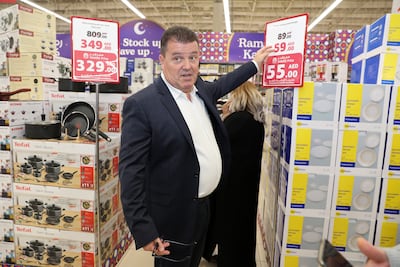Carrefour has embraced home-grown produce to help drive down its prices for Ramadan.
The retail giant has 6,000 products in its Ramadan range, many of which it says are discounted by up to 50 per cent.
It has also launched an “Emirati Fresh Festival” that will increase and promote local-produce, which does not require the same long-distance supply lines as imported goods.
The Ministry of Economy in April approved a new policy to keep a check on the prices of basic consumer goods, such as eggs, bread, flour and salt.
It said more than 40 outlets and co-operative societies in the country are being regularly monitored to keep the prices of these goods in check.
In July, the ministry said traders looking to increase the prices of 10 basic items in the UAE must first receive its approval.
Carrefour at Majid Al Futtaim Retail
The list of protected items includes cooking oil, eggs, fresh milk, rice, sugar, fresh poultry, bread, flour, cleaning detergent and legumes such as lentils, peas, chickpeas and beans.
Two years ago, the ministry reduced the prices of 30,000 food items during Ramadan, with discounts of 25 to 75 per cent.
Carrefour said UAE-grown cucumbers are among the products with the biggest price drop this Ramadan, costing Dh1.50 as part of the promotion, which the chain says is down 60 per cent.
Bundles of water will also cost less during Ramadan. A 24-pack of 500ml bottles of Masafi is now Dh8.75, saving 59 per cent on the usual price.
Ghee, which is a crucial ingredient in Ramadan meals for many, costs just under Dh10 for a litre. Carrefour says this is a drop of almost 50 per cent.
Shoppers can also save half price on five-litre bottles of sunflower oil.
Chicken breasts in the Ramadan range are reduced to Dh11.
“Providing stock that matched the cost-of-living crisis was a crucial element for us,” said Christophe Orcet, head of commercial and operations of Carrefour at Majid Al Futtaim Retail.
“The global population has been struggling for the past two to three years and issues like inflation on raw materials and the cost of energy affect the final product in the market.”

He said among the products most affected by the supply chain issues were sugar, rice and other basic food staples.
The rise in cost of living has been a continuing issue around the world since the Covid-19 pandemic disrupted the food chain.
The challenges were compounded by Russia’s invasion of Ukraine last year.
The former director general of the World Trade Organisation, Roberto Azevedo, predicted in 2022 that the crisis could continue for another three years.
“There has been more of a challenge in the last two years, and even into this year, because of the global situation,” said Mr Orcet.
“We have been struggling for the past two years with the global supply chain.
“It has been an issue in many countries, not just in the UAE. The war in Ukraine has made it more difficult to get items from suppliers.”
Focusing on staples
Carrefour has worked closely with local suppliers and producers to ensure staples are in plentiful supply in Ramadan.
“We are focusing on commodities like rice, flour and oil, because we know they are fast-moving items,” said Mr Orcet.
“We know customers with less purchasing power are more likely to focus on those items.”
The National reported from the Gulfood trade show this week that experts had spotted a global trend of shoppers buying less than before, but ensuring what they bought was at least nutritious and healthy.
Mr Orcet said he also observed that trend among UAE consumers.
“People are back visiting the stores in high frequency [since the end of the Covid-19 lockdown] but we are noticing the average basket is containing less than it would have in 2018 and 2019,” said Mr Orcet.
“Customers are much more conscious about what they are spending and are buying fewer non-essential items.
“This is what is driving our product and pricing strategies today.”
The retailer's cost-saving Ramadan range follows its programme to lock the prices of 200 essential items in October.
The scheme was due to cease in January but has been expanded until the end of March.








